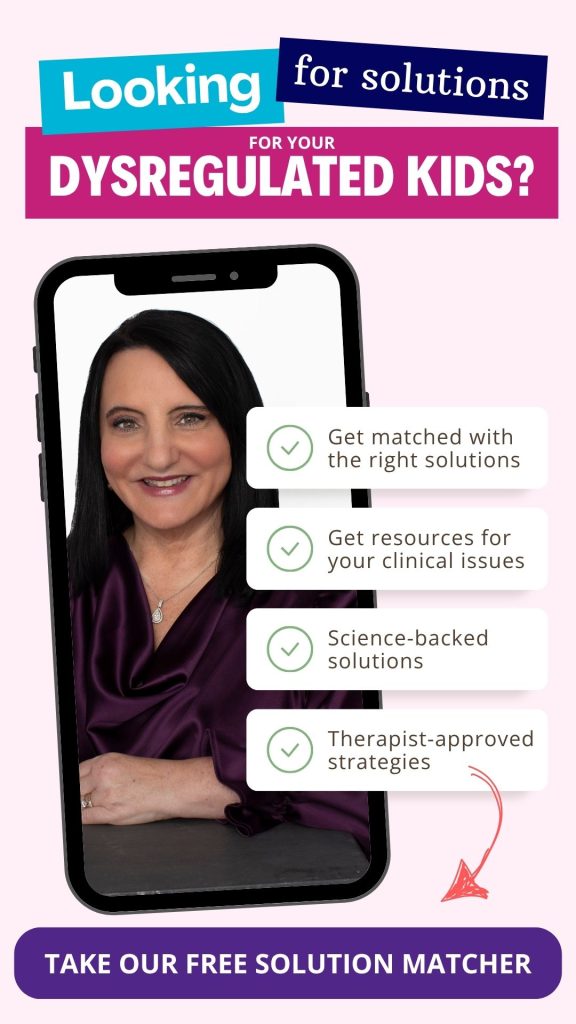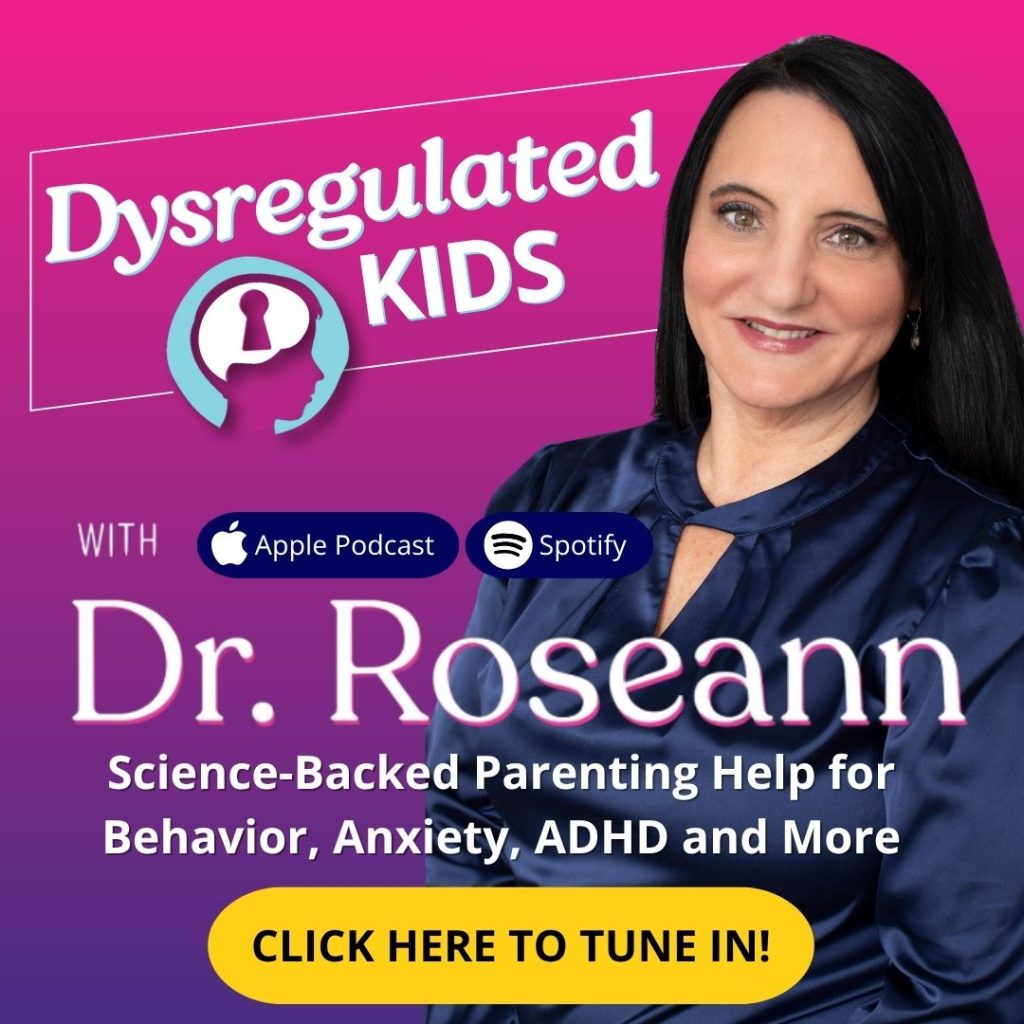Estimated reading time: 7 minutes
If your child struggles to follow directions, mishears words, or seems “tuned out” in class, it could be more than just not paying attention—it might be auditory dyslexia.
In this guide, you’ll learn what auditory dyslexia really is, the most common signs to look for, how it differs from other learning struggles, and practical tools and supports that can help your child thrive.
What Is Auditory Dyslexia in Children?

Auditory dyslexia—sometimes called dysphonetic dyslexia—shows up more often than any other type, and about one in four children with developmental dyslexia have it too (Iliadou et al., 2009). Think of it as the brain’s wiring making sound-to-symbol connections fuzzier than they should be.
Key signs include:
- Difficulty sounding out words (phonics)
- Mishearing or mispronouncing words
- Trouble following multi-step directions
- Slow, effortful reading that doesn’t match intelligence
Your child isn’t being “difficult”—their brain just processes language differently. When we calm the brain first, those fuzzy sound-to-symbol connections get clearer, and learning becomes possible.
Signs of Auditory Dyslexia in Everyday Life
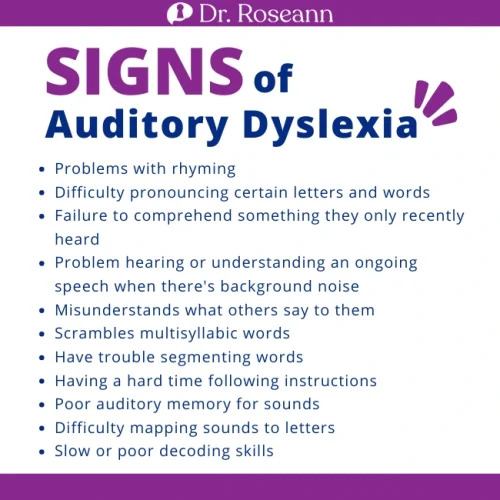
For many parents, the first clues show up at home or school.
Examples:
- Mixing up pat and bat when reading aloud
- Needing directions repeated several times
- Struggling to keep up in fast-paced conversations
- Avoiding reading because “it’s too hard”
Parent Story
Lily, a mom of a 9-year-old, noticed her daughter melted down every time spelling homework came out. “She’d say, ‘I hate words, they don’t make sense.’ Once I learned it was auditory dyslexia, I realized she wasn’t defiant—her brain just couldn’t match sounds to letters yet.”
Behaviors are communication—meltdowns often signal frustration, not defiance. When we reframe meltdowns as signs of a dysregulated brain, it changes everything—because you stop blaming your child or yourself, and start focusing on calming the brain first.
Symptoms Parents Should Watch For in Auditory Dyslexia?
Auditory dyslexia creates unique challenges with how kids hear and process sounds. Spotting the signs helps parents know when support is needed.
Common symptoms include:
- Trouble recalling sounds
- Difficulty blending or breaking words
- Confusing similar sounds
- Mixing up sound order
- Weak sound-symbol links
- Pauses or hesitations when reading
- Frequent mispronunciations
- Skipping or adding sounds
These struggles aren’t about effort or intelligence. They’re signs of a brain that processes language differently. Decode the behavior, regulate the brain.
When you see these as clues from an overwhelmed nervous system, you know where to start—by calming the brain first, so learning and confidence can follow.
How Is Auditory Dyslexia Different from Other Reading Problems?
Not every child’s dyslexia looks the same. One kid may stumble over sounds while another struggles with recognizing whole words. That’s why knowing the difference matters so much—because it points you toward the right kind of help.
- Auditory dyslexia feels like listening through static. Kids mix up sounds, struggle hearing small differences, or can’t quite blend them into smooth words.
- Visual dyslexia works differently. Children lose track of how words look on a page, forget sight words, or confuse similar shapes like b and d.
- Sometimes it’s not dyslexia at all. Attention difficulties—whether ADHD or another regulation issue—mean a child hears directions clearly yet drifts away before finishing the task.
Table: Differences at a Glance
| Challenge | Auditory Dyslexia | Visual Dyslexia | ADHD/Attention |
| Mishears sounds | ✅ | ❌ | ❌ |
| Struggles with sight words | ❌ | ✅ | ❌ |
| Trouble staying focused | ❌ | ❌ | ✅ |
A thorough evaluation clears the fog. You discover if your child’s challenges are sound-based, sight-based, or rooted in attention. From there, support becomes targeted and powerful.
When you start with regulation, your child has the calm and clarity they need for the right interventions to actually work.
What Causes Auditory Dyslexia?
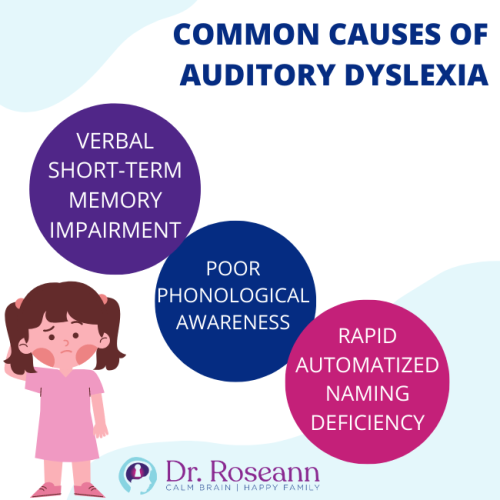
The root isn’t laziness—it’s how your child’s nervous system processes language. Dyslexia often runs in families, yet no two kids look exactly alike. Anxiety, ADHD, or auditory processing issues can make it even tougher.
To truly understand auditory dyslexia, we have to look at the thinking skills tied to language. Three core challenges often show up:
- Weak verbal memory
Kids struggle to hold sounds in short-term memory, making it harder to recall phonemes or syllables. This gap slows down reading and learning across subjects.
- Poor phonological awareness
Breaking words into sounds or blending them back together feels overwhelming. This is the hallmark struggle of dyslexia and affects overall reading efficiency.
- Rapid naming difficulties
Children can’t quickly pull up letters, numbers, or words from memory. Slow recall blocks fluency and makes reading feel like running uphill.
Behind these challenges may sit deeper roots—family history, auditory processing differences, nervous system dysregulation, or even neuroinflammation.
Decode the behavior, regulate the brain. When we calm the brain first, those language skills have the best chance to strengthen and stick.
How Can Parents Support a Child with Auditory Dyslexia at Home?
You don’t have to be a reading specialist to make a difference.
Practical strategies:
- Break directions into one step at a time
- Use visual aids (charts, checklists, pictures)
- Practice phonemic awareness with games (rhyming, sound-matching)
- Encourage audiobooks alongside print books
- Create a calm, distraction-free reading space
Parent Story
Marcus, dad of a 10-year-old, switched to nightly audiobooks. “At first, I worried he was ‘cheating,’ but then he started joining in when reading along. That confidence boost was everything.”
When you calm the brain first and pair sound with text, learning feels safer—and confidence follows.
What Are the Best Treatments and Interventions for Auditory Dyslexia?
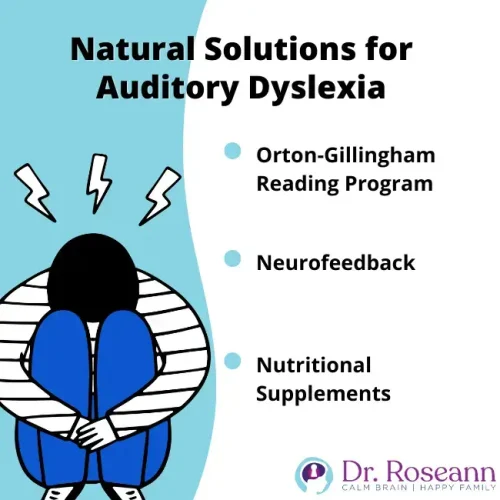
Support works best when we address both how language is processed and how the nervous system stays balanced. Calm brains learn best.
Evidence-based supports that make a difference:
- Orton-Gillingham programs – Hands-on, structured reading instruction
- Speech therapy – Strengthens how sounds are heard and organized
- Neurofeedback with QEEG mapping – Trains the brain while calming it down
- Lifestyle supports – Sleep, food, exercise, and sensory resets
In one study, kids with auditory dyslexia received just four sessions of neurofeedback. Amazingly, their brains sharpened attention and improved speech perception even in noisy settings (Kim et al., 2021).
When the brain is soothed, everything else falls into place—reading, listening, and even confidence.
When Should Parents Seek Professional Help?
Trust your gut. If your child…
- Is falling behind in reading
- Avoids homework or melts down daily
- Seems bright but struggles with sound-based learning
…it’s time for an evaluation by a neuropsychologist, speech-language pathologist, or dyslexia specialist.
Parent Story
Ana waited until her son was 11 to seek help. “I thought he’d just catch up. Once we had him tested, I cried—I wish I had known sooner. Early help would have saved years of stress.”
When you calm the brain first and get the right support in place, your child can learn and thrive without years of struggle.
What’s the Outlook for Kids with Auditory Dyslexia?
With support, kids thrive. Many go on to become excellent readers, writers, and even public speakers. What matters most is:
- Early identification
- Consistent practice with sound-symbol connections
- Nervous system regulation to reduce overwhel
And remember: dyslexia doesn’t define your child—it’s simply one part of how their brain works.
Read more about: The Neurodivergent Umbrella: A Guide to Understanding and Supporting Neurodiverse Kids
Parent Action Steps
FAQs
What age can auditory dyslexia be diagnosed?
It can be identified as early as kindergarten, though many children aren’t diagnosed until grades 2–4 when reading demands increase.
Can auditory dyslexia go away?
It doesn’t “go away,” but with early intervention, kids can build strong reading and listening skills.
Is auditory dyslexia the same as auditory processing disorder?
They overlap, but aren’t identical. Auditory processing disorder affects how the brain interprets sound, while auditory dyslexia specifically impacts reading and language.
Do kids with auditory dyslexia need an IEP?
Yes, many benefit from school accommodations such as extra time, multisensory teaching, and speech-language therapy.
How can I calm my child when they get frustrated?
Start with co-regulation—your calm nervous system helps settle theirs. Try deep breathing, sensory breaks, or short movement breaks before homework.
Citations
Iliadou, V., Bamiou, D.-E., Kaprinis, S., Kandylis, D., & Kaprinis, G. (2009). Auditory Processing Disorders in children suspected of Learning Disabilities—A need for screening? International Journal of Pediatric Otorhinolaryngology, 73(7), 1029–1034. https://doi.org/10.1016/j.ijporl.2009.04.004
Kim, S., Emory, C., & Choi, I. (2021). Neurofeedback Training of Auditory Selective Attention Enhances Speech-In-Noise Perception. Frontiers in Human Neuroscience, 15(676992). https://doi.org/10.3389/fnhum.2021.676992
Always remember… “Calm Brain, Happy Family™”
Are you looking for SOLUTIONS for your struggling child or teen?
Dr. Roseann and her team are all about science-backed solutions, so you are in the right place!



